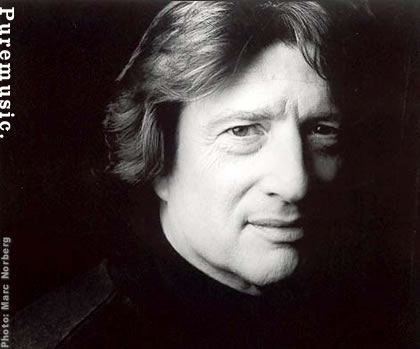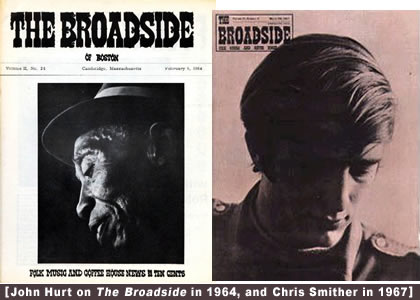
A Conversation with Chris Smither (continued)
PM: One of my small regrets in life is that I never got to see Mississippi John Hurt play.
CS: Yeah. I saw him play two or three times--three times, I guess.
PM: Did you get to befriend him? Was he a buddy of yours?
CS: No.
PM: You've just seen him play.
CS: He died in '67, and I saw him play in New York in 1964. I was on my way to Paris for a year, because I was student. I was taking a boat at the time.
PM: Wow.
CS: Yeah. It was way back.
PM: That was another time.
CS: It was. But I went to New York early on purpose to see if I could get to see some of the people whose records I was listening to. And when I got to New York, who should be playing at the Gaslight but Mississippi John Hurt.
PM: Oh, my lord.
CS: And I went down to see him.
PM: You remember that show well?
CS: Oh, I do, I really do.
PM: Yeah. And he played solo, right?
CS: Well, actually, no. There was a guy playing harmonica with him, which really irritated me.
PM: I'll bet it did.
CS: Because I wanted to hear the guitar playing. So I asked some guy who was sitting next to me, "Who is the harmonica player?" And the guy said, "Oh, isn't he fabulous?" And I said, "Well, I'd rather hear him solo. But who is it?" And the guy says, "Oh, his name is John Sebastian."
[laughter]
CS: And I remember being enormously impatient because it seemed to me that the opening act was interminable, and I wanted to get to John Hurt. And it was some guy in a madras shirt named Tom Paxton. I'd never heard of him.
[laughter]
PM: Oh, shit, that's funny.
CS: It was a riot.
PM: Oh, my God. Yeah, I think the first song I ever played out in my life was a Tom Paxton song.
CS: Really?
PM: Yeah, it's amazing. I played at a high school talent show. It was "Job Of Work." That's the first tune I ever performed in my life.
CS: Hey, yeah.

PM: This morning I got the latest album by your producer, David Goodrich, in the mail.
CS: Yeah, what was it called?
PM: Dust of Many Horses.
CS: Yeah, I've heard that.
PM: We're acquainted with his genius from the work of Peter Mulvey. [see our recent interview with Peter]
CS: Yeah.
PM: But I'd like hear about it and about him from you, if you'd be so kind, about Goody.
CS: Oh, the smartest thing I ever did was get him to produce me. I was casting around for somebody new, and I'd been working with Stephen Bruton. I had a really good time working with Stephen, but I just thought it was time to do something with somebody else. And I had some people in mind. And Peter Mulvey had said, "You should work with Goody. Goody would do a good job with you."
PM: Yeah.
CS: And I thought, well, I'll think about it. And then out of the clear blue sky--well, maybe not such a clear blue sky--Goody called me up. And he made a pitch for himself.
PM: Are you kidding me?
CS: No, I'm not.
PM: He made a pitch for himself. Well isn't that something.
CS: Yeah, he did. He said, "I know you're thinking about so-and-so and so-and-so, and these other people, but I just wanted to call you and make sure that you understood that in my mind, I could do you. I could produce you the way you're supposed to sound."
[laughter]
CS: And I said, "Well, thanks for calling. I'll keep it in mind. I'll put some thought into it." And he said, "Please do, because I really would enjoy doing it." And so then I went back and I listened to this--I had like a minidisk of some stuff that we'd been doing just sitting around the living room. He was over one day. And I listened to it, and I realized that he was right. He really understood what I was doing. He was just playing along on some slide, and this, that, and the other. And then I went back and I listened to one of Peter's records. And I realized that the guy operates out of a very broad palate. He's got a lot of ideas.
PM: Right. He's a very wide-open character.
CS: Yeah. So I said, "Let's do it." And so we did Train Home. And I was just more pleased with that than I'd been with any record I'd ever done.
PM: Wow.
CS: So I couldn't wait to do another one. And of course by the time we wound up doing this one, Leave the Light On, he had a lot more production under his belt.
PM: Right.
CS: He's been working really hard.
PM: And his playing sounds better every time I hear him.
CS: Oh, yeah. I mean, he's grown my leaps and bounds. He's about forty-one now.
PM: Is that all? Hmm. Yeah, he's hot. I'm looking forward to hearing his Dust of Many Horses. One of my favorite musicians--I live in Nashville--is all over this great record of yours, Tim O'Brien.
CS: Oh, Tim, yeah. It's funny, because David asked me, "You got anybody you want to use on this record?" And I said, "Well, we could ask Tim O'Brien," because I'd done a couple of short tours with him. We've gotten to be pretty good friends.
PM: Great guy. [see our interview with Tim from a couple years back]
CS: He is a great guy. And Goody looked at me and said, "Do you think he'd do it?" And I said, "Sure, he'd do it if he's got the time."
[laughter]
CS: And he said, "My job is over."
[laughter]
PM: That is the right producer. Oh, that's something. And I love how Tim never gets on a record just in one way. If he's playing, he's singing.
CS: Yeah. I mean, he's fabulous. He came up, he flew up. I picked him up at the airport. We went to the studio. I mean, we were staying at the studio, too. It was kind of a place out in the country that's got an apartment. And we basically got the whole job done in about six hours.
PM: What?
CS: Yeah.
PM: That is making short work of it.
CS: Yeah. It was amazing.
PM: That's something else. continue
print (pdf) listen to clips puremusic home